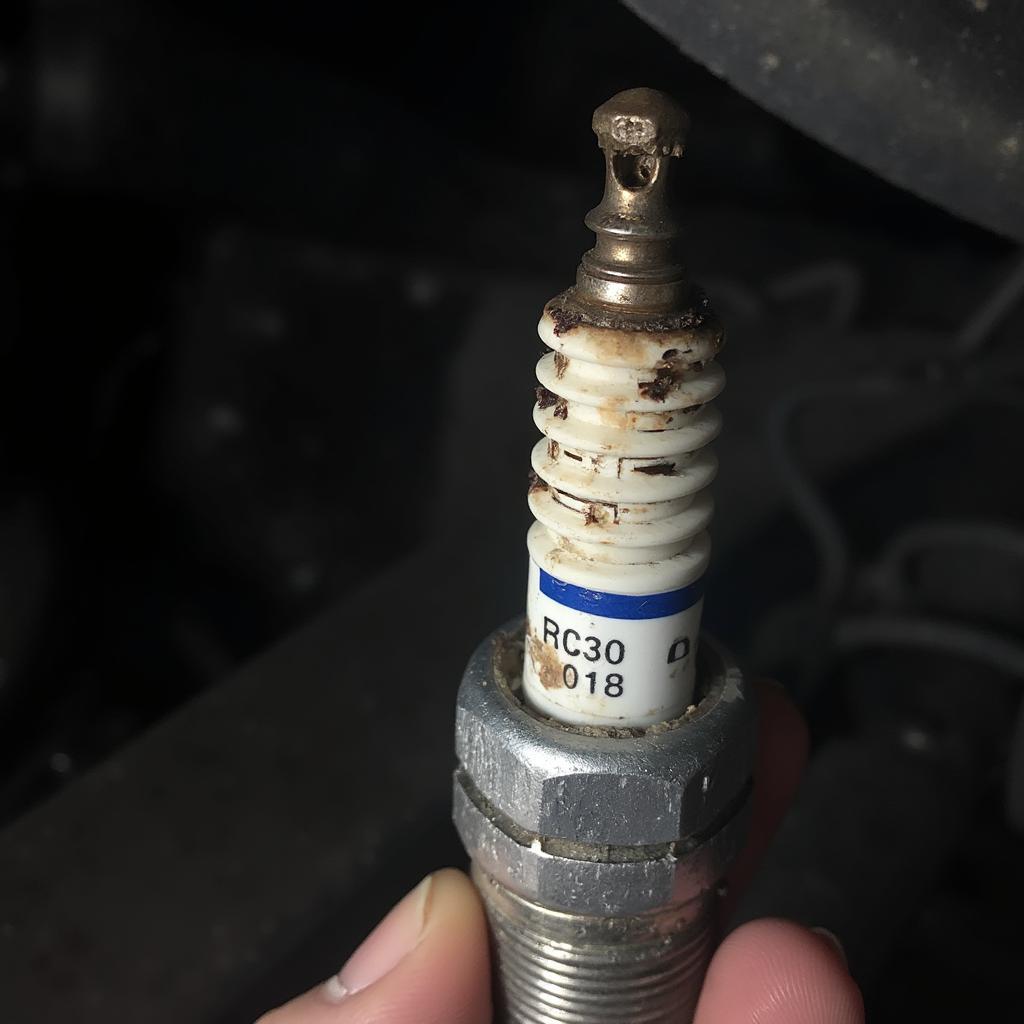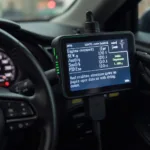A misfire in your vehicle’s engine can be a frustrating and potentially damaging issue. Understanding what “MIS” means in OBD2 context is crucial for diagnosing and resolving this problem effectively. “MIS” refers to a misfire, an event where the air-fuel mixture in a cylinder fails to ignite properly. This article will delve into the meaning of OBD2 MIS codes, their causes, and the steps you can take to address them.
If you’ve ever seen a “check engine” light illuminate on your dashboard accompanied by rough idling, decreased power, or poor fuel economy, a misfire might be the culprit. Knowing how to interpret these codes can save you time and money in the long run. Let’s explore the world of OBD2 MIS codes and empower you to tackle this common automotive problem.
Decoding the OBD2 MIS Code
An OBD2 MIS code indicates which cylinder is experiencing the misfire. For example, a P0301 code signifies a misfire in cylinder 1, P0302 in cylinder 2, and so forth. These codes provide valuable insights into the location of the problem, guiding you towards a more targeted diagnosis. Identifying the affected cylinder is the first step towards fixing the issue. It’s important to note that a general misfire code, such as P0300, indicates random misfires occurring across multiple cylinders. This can make diagnosis more challenging, requiring a more systematic approach.
Having an obd2 computer pulled.emissions code can help pinpoint the issue further.
Common Causes of OBD2 MIS Codes
Several factors can contribute to engine misfires, ranging from simple spark plug issues to more complex problems with the fuel system or ignition coils. Understanding these potential causes can help you narrow down the possibilities and expedite the diagnostic process.
- Faulty Spark Plugs: Worn-out or fouled spark plugs are a frequent cause of misfires. Over time, the electrode gap can wear down, hindering the spark’s ability to ignite the air-fuel mixture effectively.
- Malfunctioning Ignition Coils: Ignition coils provide the high voltage necessary for the spark plugs to fire. A failing coil can disrupt this process, leading to misfires.
- Fuel System Issues: Problems with fuel injectors, fuel pump, or fuel filter can disrupt the proper delivery of fuel to the cylinders, causing an imbalance in the air-fuel mixture and resulting in misfires.
- Vacuum Leaks: Leaks in the intake manifold or vacuum hoses can introduce excess air into the engine, disrupting the air-fuel ratio and contributing to misfires.
- Sensor Problems: Faulty sensors, such as the mass airflow sensor (MAF) or oxygen sensor, can provide inaccurate readings to the engine control unit (ECU), leading to improper fuel delivery and misfires.
Troubleshooting OBD2 MIS Codes: A Step-by-Step Guide
-
Check the OBD2 Code: Use an OBD2 scanner to retrieve the specific MIS code. This will pinpoint the affected cylinder(s).
-
Inspect the Spark Plugs: Examine the spark plugs for signs of wear, fouling, or damage. Replace worn or damaged spark plugs as needed.
-
Test the Ignition Coils: Use a multimeter or a dedicated ignition coil tester to check the resistance and functionality of the ignition coils. Replace faulty coils as necessary.
-
Inspect Fuel Injectors: Check for clogged or leaking fuel injectors. You can use a fuel injector cleaner or have them professionally tested and cleaned if necessary.
-
Check for Vacuum Leaks: Inspect the intake manifold and vacuum hoses for any signs of leaks or damage. Use a vacuum gauge or a smoke test to identify leaks.
-
Test Relevant Sensors: Use a multimeter or an OBD2 scanner to test the functionality of the MAF sensor, oxygen sensor, and other relevant sensors. Replace faulty sensors.
If your obd2 plug is missing 7 pins, you might have difficulty retrieving codes.
What if the Problem Persists?
If the misfire persists after addressing these common causes, it’s essential to consult with a qualified mechanic for further diagnosis and repair. More complex issues, such as mechanical problems within the engine, might require specialized tools and expertise.
“Ignoring a persistent misfire can lead to severe engine damage, including catalytic converter failure and decreased engine performance,” says automotive expert, Dr. James Miller, PhD, Mechanical Engineering. “Addressing the issue promptly is crucial for maintaining the health and longevity of your vehicle’s engine.”
OBD2 MIS Meanings and FAQs
What does a P0300 code mean?
A P0300 code indicates random misfires across multiple cylinders.
What causes a P0304 code?
A P0304 code signifies a misfire in cylinder 4, often caused by faulty spark plugs, ignition coils, or fuel injectors.
Is there an obd2 bluetooth dnx compatible with my vehicle?
Conclusion
Understanding what “MIS” means in the context of OBD2 codes is essential for effective vehicle maintenance. By familiarizing yourself with the common causes of misfires and following the troubleshooting steps outlined in this article, you can diagnose and address these issues efficiently. Don’t hesitate to consult a professional mechanic for persistent problems, as early intervention can prevent further engine damage. Regular maintenance and prompt attention to OBD2 codes will help keep your vehicle running smoothly and reliably for years to come.
If you need further assistance or have specific questions, please contact our 24/7 support team via WhatsApp: +1(641)206-8880 or Email: [email protected]. We are here to help!


